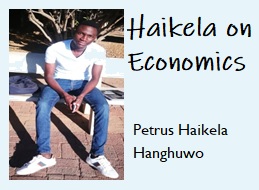
Too many cents deposited into disposal accounts slow the economy
By Petrus Haikela Hanghuwo
It is a communal tendency amongst inhabitants of countless nation-states to keep “cents” into their disposal accounts. Even though “a sum of cents does not sum up to another ‘cent(s)’” at all, this is forgotten.
The sub-unit of currency that equals to a one-hundredth of the main unit of currency is called “cent.” Even if in some terms “cent” is defined as a small unit of money, it can be specified in terms of Namibian dough as a monetary unit equal to one hundredth of Namibian dough.
The disposal account, generally, is defined as an account in which the unwanted properties are deposited.
Now, this indicates that a disposal account is the account to which the “cents” are deposited. Again, it’s basically where “cents” are dropped off once their need to be used is no more documented.
This brings us to the conclusion that too many one hundredths of Namibian dollars lying idle somewhere, therefore, leads to shortages of money circulating in money markets within the economy.
But, for the whys and wherefores?
Because majority, if not all people, keep coins in homes per annum until one year becomes years with just coins kept in the houses at their disposal.
Economically, every central bank across the globe prints coins and paper money for its state; however, concerns have been raised over decades in the regard of currency circulation in the market.
The central banks over countries experience tremendous differences between the opening balances and closing balances in each of their financial periods. Deficit occurs, usually, whose one of its determinant is the “cents” that remain at the disposal of the households. Households do not take back the cents (coins) to the markets.
There is still an unanswered question, why is it considered as “poverty or abnormal” to buy with coins rather than paper money?
Pettinger (2019) emphasizes that printing more money doesn’t increase any outputs of the economy, but negates the normality of the economy of the country, and in comparison with other states’ economies.
There is lack of awareness amongst large populations about the use of “cents” (coins) that households keep in their houses. There is an actual prerequisite to inform nations how crucial it is to meet the central banks halfway. To put this plainly, it will be best if households cease the tendency to keep cents at disposal and rather deposit back into the commercial banks which will therefore deposit back to the major bank, the central bank.
This will of course help to ease the uneven routes towards equal distribution of income and wealth within the country.
The blame has always been ascribed to governments for not spending too much on welfare; however, there is also much that households can do to meet the government midway.
It’s therefore unquestionable that the whole population should rather develop the propensity of depositing coins into the commercial banks which will enable the central banks, for e.g. Bank of Namibia, to receive the money and channel it back to the economy.
As alternatives, let’s imagine that there is N$1 million (N$ 1 000 000.00) coins in total that are kept in the houses in Namibia at large. We all know the central bank of Namibia prints the Namibian dollar and supplies it to the economy.
The N$ 1 million in total is kept in the houses and remains unspent while the central bank of Namibia is expecting to have its currencies spent wisely to keep the economy strong, so, if this year the money that doesn’t get back into the economy is N$1 million, it clearly indicates that the money market is N$1 million short in the financial year 2021.
The question is: Is this practice carrying on? If yes, how much coins will end up kept at disposal in the houses in the end? Millions of coins right?
But, if this money is invested back to the economy, if households choose to deposit back into the commercial banks, the N$1 million that the economy is currently short with (according to the example we have), it means the economy (Namibian country as the example) will be extra N$1 million richer than now.
Does this not make sense folks?
The N$00.05, N$00.10 and N$00.50 will total a million dollar as per our example.
Moreover, not only will this save the economy, but also it will enrich each household that is currently keeping the cents (coins) at the disposal (in the houses). Pettinger (2019) suggests that money couldn’t be printed in excess if the economy wishes to boost output, but it’s how money is spent that decides whether the output must increase or not.
– Mr. Petrus Haikela Hanghuwo (UNAM, Economics Graduate 2020)



